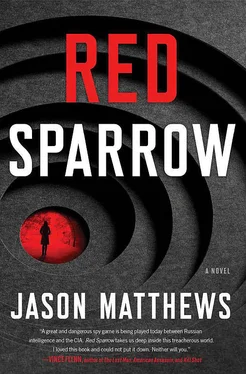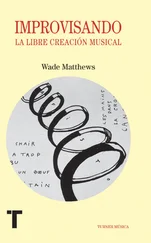“Stephanie, you don’t have shingles, do you?” asked Golov. He would have to transmit this information instantly, tonight.
She looked at him with irritation. “That’s not the point. You know as well as I that I cannot jeopardize my position. I’ve worked too long and hard to get where I am.”
Golov marveled that her colossal ego could translate this deadly serious game as a potential derailment to her career. Did she know the dangers involved? The consequences? “This is exactly why I insist we begin meeting in hotel rooms.”
“I’ll consider it,” said Boucher. She appraised the waiter as he set her third drink down, staring at him as he walked away. “But now there’s something else,” she said in a flat tone, the one she used during congressional testimonies. “If you people make a mistake and the feds come knocking on my door, I will not go to prison. I won’t go. So I want you to give me something… permanent. Something I can take.”
Golov sat back in his chair and marveled. The mention of a mole hunt has unsettled her, and now she wants an L-pill, a US senator. Where did she hear of this? He reached forward, held both of Boucher’s hands lightly in his fingers, and spoke softly. “Stephanie, that is the most amazing thing I have heard you say. You cannot be serious. You’re speaking of ancient history, of Cold War myths. There is no such thing.”
“I think you’re lying to me, Anatoly,” she said, smiling thinly as she twisted away from his hands. “Either I get one, or I dissolve our ‘partnership,’ as you call it. When we meet next month—you will be here next month, on time?—I expect a cute little pillbox; make it ivory or mother-of-pearl.”
“I can still hardly believe it,” said Golov. “I will consult with Moscow, but I doubt they will grant authorization.”
As was her custom, Senator Boucher waited until the end of their meeting before she dug into her purse and slid a black disc across the table toward Golov. Before putting it into his pocket, he saw the Pathfinder logo inscribed on the side. The senator certainly knew how to play for drama, Golov thought as he watched her walk unsteadily out. Shingles.
=====
Anatoly Golov sat in a New England–style rocking chair in a room in the Tabard Inn. The smallish room had florid purple walls, framed posters of French circus animals, was carpeted with a riotous Persian carpet, and featured an oversized four-poster bed in the corner of the room.
Since his last meeting with SWAN, there had been no abatement in surveillance on rezidentura officers. Instead of risking another long SDR, Golov had received the Center’s approval to attempt a “trunk escape” to get black. On the morning of the meeting day, Golov had lain in the trunk of the car of the economic counselor, breathing pure oxygen from a small tank through a face mask. Three embassy wives drove, with absolutely no regard for surveillance, to Friendship Heights on upper Wisconsin Avenue. Following instructions, the thick-waisted wives parked in the underground parking garage, locked the car, and went shopping.
Another Russian spouse sitting in the garage watched the parked car for fifteen minutes. There had been no surveillance; it was clean. Carrying shopping bags, the wife simply walked up to the car, tapped lightly twice, and unlocked the trunk to let a cramped and pissed-off Golov out.
He cursed the SWAN case, and cursed Moscow, and cursed the Service, but he was black, undetected, surveillance-free. The trunk escape had worked. He left the garage and made his way south into the District by walking, getting on random buses, and hailing an occasional taxi. He avoided the Metro system with its ubiquitous cameras. He reached Dupont Circle and killed two hours in bookshops and in a little bistro. At sunset, at the height of rush hour, he walked around the Circle, south down Nineteenth, onto N Street, and four blocks to the Tabard Inn. No sign of surveillance. He had dressed casually, for a change, to blend in on the street, with a muted suede jacket over a brown crewneck, corduroy slacks, and suede walking shoes. Thank God for the good shoes. As he entered the inn he slipped on a pair of heavy-framed eyeglasses with clear-glass lenses.
Golov sat in the hotel suite and finished a plate of Aegean clams that had been broiled with oregano, goat cheese, lemon, and oil, accompanied by a bottle of chilled Tuscan Vernaccia. He was relieved that he had rented the room, using a forged US driver’s license and traveler’s checks, without a problem. It had been a number of years since Golov had rented a hotel room in alias—that was a young man’s game—and he had relived the tense, dry-mouthed drill with cool enjoyment. Despite his foreign accent, and the fact that he had no reservation and no luggage, the oblivious clerk behind the desk was satisfied. This was a distinguished gentleman. He was shown to the small but elegant room on the second floor, where they would be out of the public eye. Privacy was paramount, especially tonight, with what he had to give her.
He finished his supper, went into the bathroom to splash water on his face, look into the mirror, and again curse the Service. Locking his door, Golov descended to the small lobby and sat in a slightly musty green baize couch facing the front door. He waited, keyed up, an unread magazine in his lap.
Senator Boucher walked into the place as if she owned it. She didn’t see Golov sitting on the couch—the clear-lens eyeglasses broke up his patrician features—and passed him within two feet. Boucher walked through a room to be seen, not to notice who else was there. Golov silently caught her in the corridor and steered her up the small staircase to the second floor. No one had seen them. Golov unlocked the door and let Boucher enter first. The senator looked around the room and smirked.
“Anatoly, how cozy, I always suspected you were a romantic.”
Ignoring the comment, Golov offered SWAN a glass of wine, which she accepted in lieu of scotch. “Meeting indoors improves our security, Stephanie,” said Golov, “but we must choose another hotel for next time. I insist, and so does Moscow.”
“How very nice for you and Moscow,” said SWAN, holding out her glass for more wine. “Did you bring me my… vitamins? Tell me you did, Anatoly, and I will be very happy.”
Golov thought of an agent he once ran in East Beirut, a Maronite Christian, who had gotten so accustomed to demanding money and gifts before sharing his information that the situation became impossible. Golov had directed a KGB Vympel team to sink his weighted body off Raouché and the Pigeons’ Rocks, past the forty-five-fathom line. He looked at SWAN and daydreamed.
“I have positive news,” said Golov. He poured another glass of wine and sat next to her on the small velveteen couch. He took an oblong box out of his jacket pocket and set it on the table. He opened the box to reveal an elegant pen nestled in a bed of powder-blue silk. It was a Montblanc Etoile, with a black hourglass barrel, flared crème-colored cap, and the iconic Montblanc inlaid white star at the tip. At the end of the pocket clip was a perfect Akoya pearl. Boucher reached for the pen, saying, “How lovely.”
Golov gently stopped her by holding her wrist and pulling her hand back. “It’s a beautiful pen,” said SWAN. “But I asked for something I could take, a pill.”
“There are no pills,” Golov said rather brusquely. “We have consented to your quite remarkable request, and this is what we will give you.” He picked up the pen and gripped the pearl in his fingertips. “You must grasp the pearl firmly,” he said. “And pull gently but steadily…” The pearl suddenly came free. It was attached to the end of a one-inch needle that slid out of a channel on the underside of the pocket clip. The needle had a burnt coppery hue to it, as if it had been held over a flame. Golov slid the needle back into its sheath in the clip and firmly pushed the pearl past a detent into the locked position.
Читать дальше












